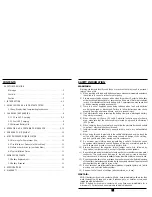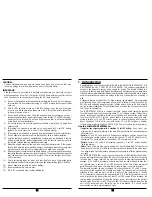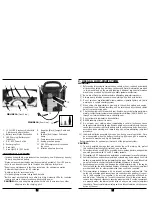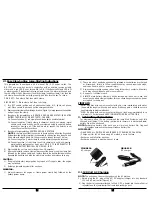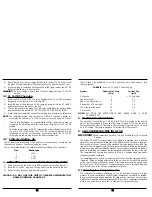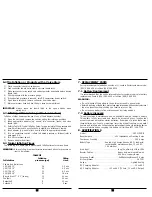
2
SAFETY INFORMATION
WARNINGS:
Warning statements identify conditions or practices that may result in personal
injury or loss of life
1) When working with lead acid batteries, always make sure immediate assistance
is available in case of accident or emergency.
2) Always use protective eyewear when using this product. Contact with battery
acid may cause blindness and/or severe burns. Be aware of first aid procedures
in case of accidental contact with battery acid. Compressor use may cause dust
or debris, creating possible eye hazards.
3) There is a risk of explosive gases being released when lead acid batteries
are being charged or discharged. Failure to follow instructions may cause
property damage, explosive hazard, and/or personal injury.
4) If an alarm sounds when connecting the battery clamps to a discharged battery,
the polarity is reversed.
5) When charging unit from a 120 volt AC electrical outlet in any wet or damp
area, make sure that the outlet used is protected by a ground fault interrupt
(GFCI) outlet.
6) When charging the unit near water, do not allow the electrical cords and outlets
to get wet – electrical shock could result.
7) Jump-start procedures should only be performed in a safe, dry, well-ventilated
area.
8) When using this unit in proximity to the vehicle’s battery and engine, stand the
unit on a flat, stable surface, and be sure to keep all clamps, cords, clothing,
and body parts away from moving vehicle components.
9) Do not wear vinyl clothing when jump-starting a vehicle, friction can cause
dangerous static-electricity sparks. Remove all jewelry or metal objects that
could cause short circuits or react with battery acid.
10) Always disconnect the negative (black) jumper cable first: followed by
the positive (red) jumper cable, except for positive ground systems.
11) Never allow red and black clamps to touch each other or another common metal
conductor. This could cause damage to the unit and/or create sparking/
explosion hazard. Always store battery clamps in built-in holsters when not in use.
12) Do not expose battery to fire or intense heat as it may explode. Before disposing
of the battery, protect exposed terminals with heavy-duty electrical tape to prevent
shorting (shorting can result in injury or fire).
13) Do not smoke or use inflammable items (matches, cigarette lighters, etc.) while
working on a vehicle’s battery system.
14) Keep unit out of reach of children (whether stored, or in use).
FIRST AID:
SKIN: If battery acid comes in contact with skin, rinse immediately with water, then
wash thoroughly with soap and water. If redness, pain, or irritation occurs, seek
immediate medical attention.
EYES: If battery acid comes in contact with eyes, flush eyes immediately, for a
minimum of 15 minutes and seek immediate medical attention.
CONTENTS
SAFETY INFORMATION
Warnings . . . . . . . . . . . . . . . . . . . . . . . . . . . . . . . . . . . . . . . 2
First Aid . . . . . . . . . . . . . . . . . . . . . . . . . . . . . . . . . . . . . . . . 2
Caution . . . . . . . . . . . . . . . . . . . . . . . . . . . . . . . . . . . . . . . . . 3
1. INTRODUCTION . . . . . . . . . . . . . . . . . . . . . . . . . . . . . . . . . 4, 5
2. USING JUMPER AS A JUMP-START SYSTEM . . . . . . . . . . . . . . . . 6
2.1 Easy, Step-by-Step Jump-starting Instructions . . . . . . . . . . . . . 7
3. CHARGING/RECHARGING . . . . . . . . . . . . . . . . . . . . . . . . . . . 8
3.1 120 volt AC Charging . . . . . . . . . . . . . . . . . . . . . . . . 8, 9
3.2 12 volt DC Charging . . . . . . . . . . . . . . . . . . . . . . . . . . . . 9
3.3 Estimated Battery Life . . . . . . . . . . . . . . . . . . . . . . . . . . . . 9
4. OPERATING AS A PORTABLE POWER SUPPLY . . . . . . . . . . . 9, 10
5. EMERGENCY WORKLIGHT . . . . . . . . . . . . . . . . . . . . . . . . . . 10
6. AIR COMPRESSOR/TIRE INFLATOR . . . . . . . . . . . . . . . . . . . . . 10
6.1 Warnings for Compressor Use . . . . . . . . . . . . . . . . . . . . . 10
6.2 Tire Inflation or Products (w/Valve Stem) . . . . . . . . . . . . . . 11
6.3 Inflate other Articles (w/out Valve Stem) . . . . . . . . . . . . . . 11
6.4 Typical Inflation Times . . . . . . . . . . . . . . . . . . . . . . . . . . . 11
7. REPLACEMENT PARTS . . . . . . . . . . . . . . . . . . . . . . . . . . . . . . 12
7.1 Battery Replacement . . . . . . . . . . . . . . . . . . . . . . . . . . . . 12
7.2 Battery Disposal . . . . . . . . . . . . . . . . . . . . . . . . . . . . . . . 12
8. SPECIFICATIONS . . . . . . . . . . . . . . . . . . . . . . . . . . . . . . . . . .12
9. WARRANTY . . . . . . . . . . . . . . . . . . . . . . . . . . . . . . . . . . . . . . . .


